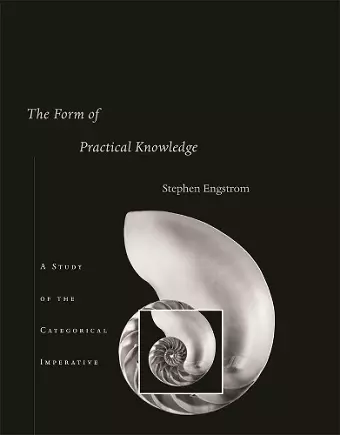The Form of Practical Knowledge
A Study of the Categorical Imperative
Format:Hardback
Publisher:Harvard University Press
Published:27th May '09
Currently unavailable, and unfortunately no date known when it will be back

Stephen Engstrom provides a highly original interpretation of the categorical imperative as the criterion of rational knowledge and action. In focusing on the general formula and the law-of-nature variant, and trying to make them work, the book presents a welcome counterweight to currently fashionable interpretations that dismiss these formulations in favour of the second variation, commonly called the "formula of humanity." -- Jens Timmermann, University of St Andrews
Immanuel Kant’s claim that the categorical imperative of morality is based in practical reason has long been a source of puzzlement and doubt, even for sympathetic interpreters. Engstrom provides an illuminating new interpretation of the categorical imperative, arguing that we have exaggerated and misconceived Kant’s break with tradition.
Immanuel Kant’s claim that the categorical imperative of morality is based in practical reason has long been a source of puzzlement and doubt, even for sympathetic interpreters. Kant’s own explanations, which mainly concern his often-criticized formula of universal law, are laconic and obscure, leading interpreters to dismiss them in favor of less ambitious claims involving his other famous formulas.
In The Form of Practical Knowledge, Stephen Engstrom provides an illuminating new interpretation of the categorical imperative, arguing that we have exaggerated and misconceived Kant’s break with tradition: Kant never departs from the classical conception of practical reason as a capacity for knowledge of the good. His distinctive contribution is the idea that morality’s imperatives express the form of such knowledge.
By developing an account of practical knowledge that situates Kant’s ethics within his broader epistemology and rethinks numerous topics in his moral psychology and in his account of practical reason (including desire, intention, choice, will, as well as pleasure, happiness, and the good), Engstrom’s work promises to deepen and to reshape our understanding of Kantian ethics.
Stephen Engstrom provides a highly original interpretation of the categorical imperative as the criterion of rational knowledge and action. In focusing on the general formula and the law-of-nature variant, and trying to make them work, the book presents a welcome counterweight to currently fashionable interpretations that dismiss these formulations in favour of the second variation, commonly called the "formula of humanity." -- Jens Timmermann, University of St Andrews
ISBN: 9780674032873
Dimensions: 235mm x 156mm x 25mm
Weight: 567g
278 pages